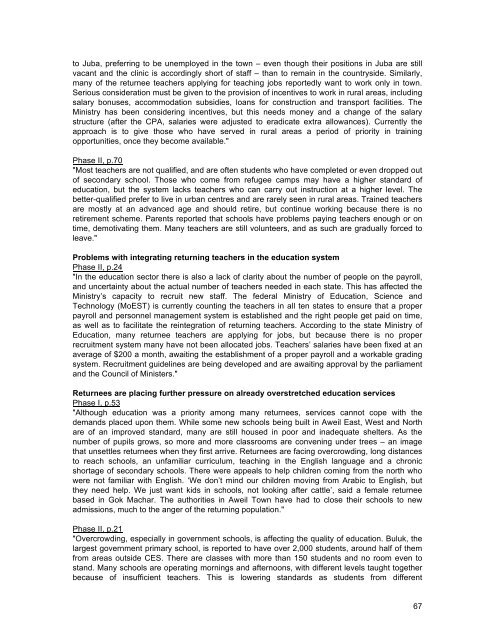SUDAN: Durable solutions elusive as southern IDPs return and ...
SUDAN: Durable solutions elusive as southern IDPs return and ...
SUDAN: Durable solutions elusive as southern IDPs return and ...
Create successful ePaper yourself
Turn your PDF publications into a flip-book with our unique Google optimized e-Paper software.
to Juba, preferring to be unemployed in the town – even though their positions in Juba are still<br />
vacant <strong>and</strong> the clinic is accordingly short of staff – than to remain in the countryside. Similarly,<br />
many of the <strong>return</strong>ee teachers applying for teaching jobs reportedly want to work only in town.<br />
Serious consideration must be given to the provision of incentives to work in rural are<strong>as</strong>, including<br />
salary bonuses, accommodation subsidies, loans for construction <strong>and</strong> transport facilities. The<br />
Ministry h<strong>as</strong> been considering incentives, but this needs money <strong>and</strong> a change of the salary<br />
structure (after the CPA, salaries were adjusted to eradicate extra allowances). Currently the<br />
approach is to give those who have served in rural are<strong>as</strong> a period of priority in training<br />
opportunities, once they become available."<br />
Ph<strong>as</strong>e II, p.70<br />
"Most teachers are not qualified, <strong>and</strong> are often students who have completed or even dropped out<br />
of secondary school. Those who come from refugee camps may have a higher st<strong>and</strong>ard of<br />
education, but the system lacks teachers who can carry out instruction at a higher level. The<br />
better-qualified prefer to live in urban centres <strong>and</strong> are rarely seen in rural are<strong>as</strong>. Trained teachers<br />
are mostly at an advanced age <strong>and</strong> should retire, but continue working because there is no<br />
retirement scheme. Parents reported that schools have problems paying teachers enough or on<br />
time, demotivating them. Many teachers are still volunteers, <strong>and</strong> <strong>as</strong> such are gradually forced to<br />
leave."<br />
Problems with integrating <strong>return</strong>ing teachers in the education system<br />
Ph<strong>as</strong>e II, p.24<br />
"In the education sector there is also a lack of clarity about the number of people on the payroll,<br />
<strong>and</strong> uncertainty about the actual number of teachers needed in each state. This h<strong>as</strong> affected the<br />
Ministry’s capacity to recruit new staff. The federal Ministry of Education, Science <strong>and</strong><br />
Technology (MoEST) is currently counting the teachers in all ten states to ensure that a proper<br />
payroll <strong>and</strong> personnel management system is established <strong>and</strong> the right people get paid on time,<br />
<strong>as</strong> well <strong>as</strong> to facilitate the reintegration of <strong>return</strong>ing teachers. According to the state Ministry of<br />
Education, many <strong>return</strong>ee teachers are applying for jobs, but because there is no proper<br />
recruitment system many have not been allocated jobs. Teachers’ salaries have been fixed at an<br />
average of $200 a month, awaiting the establishment of a proper payroll <strong>and</strong> a workable grading<br />
system. Recruitment guidelines are being developed <strong>and</strong> are awaiting approval by the parliament<br />
<strong>and</strong> the Council of Ministers."<br />
Returnees are placing further pressure on already overstretched education services<br />
Ph<strong>as</strong>e I, p.53<br />
"Although education w<strong>as</strong> a priority among many <strong>return</strong>ees, services cannot cope with the<br />
dem<strong>and</strong>s placed upon them. While some new schools being built in Aweil E<strong>as</strong>t, West <strong>and</strong> North<br />
are of an improved st<strong>and</strong>ard, many are still housed in poor <strong>and</strong> inadequate shelters. As the<br />
number of pupils grows, so more <strong>and</strong> more cl<strong>as</strong>srooms are convening under trees – an image<br />
that unsettles <strong>return</strong>ees when they first arrive. Returnees are facing overcrowding, long distances<br />
to reach schools, an unfamiliar curriculum, teaching in the English language <strong>and</strong> a chronic<br />
shortage of secondary schools. There were appeals to help children coming from the north who<br />
were not familiar with English. ‘We don’t mind our children moving from Arabic to English, but<br />
they need help. We just want kids in schools, not looking after cattle’, said a female <strong>return</strong>ee<br />
b<strong>as</strong>ed in Gok Machar. The authorities in Aweil Town have had to close their schools to new<br />
admissions, much to the anger of the <strong>return</strong>ing population."<br />
Ph<strong>as</strong>e II, p.21<br />
"Overcrowding, especially in government schools, is affecting the quality of education. Buluk, the<br />
largest government primary school, is reported to have over 2,000 students, around half of them<br />
from are<strong>as</strong> outside CES. There are cl<strong>as</strong>ses with more than 150 students <strong>and</strong> no room even to<br />
st<strong>and</strong>. Many schools are operating mornings <strong>and</strong> afternoons, with different levels taught together<br />
because of insufficient teachers. This is lowering st<strong>and</strong>ards <strong>as</strong> students from different<br />
67
















